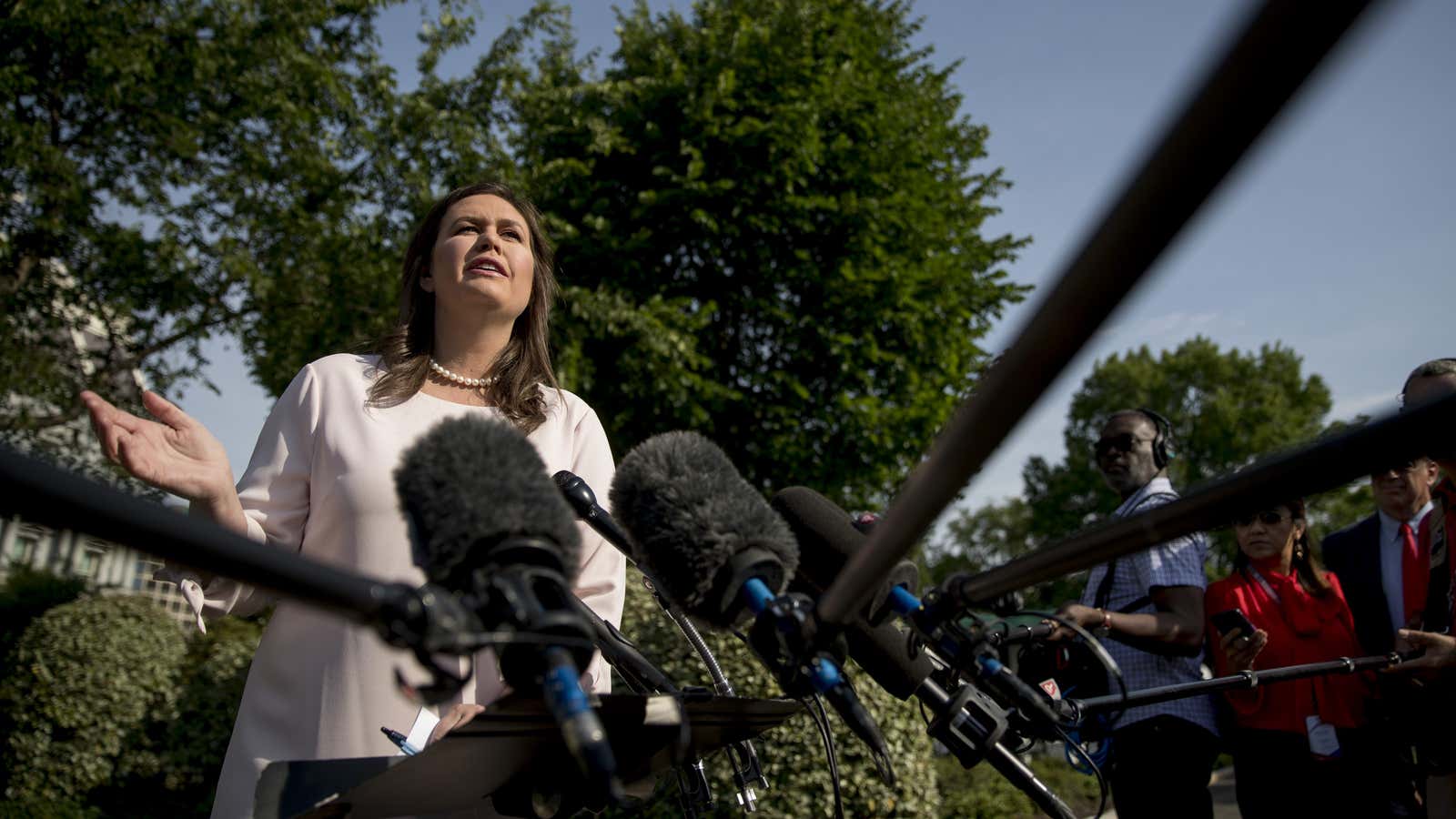It really doesn’t matter who replaces Sarah Huckabee Sanders as White House press secretary. The White House press office has been broken for a long time.
Sanders’ departure provided a good example: Donald Trump announced it by tweet.
The president followed up this morning (June 14) with a rambling call to Fox News that went on so long that the host appeared to be trying to get Trump off the phone, telling him “I know it’s your birthday, and you’ve got a country to run.”
Sanders hadn’t held an official press conference in more than three months. Her briefings were so prone to error, partisan attacks on Trump’s opponents and outright lies that CNN started fact-checking them in real time. Sanders was called out by name five time for lying to the media in Robert Mueller’s report on Russian interference in the 2016 US presidential campaign.
US taxpayers foot the bill for her anyway, paying Sanders about $180,000 a year, part of the $2.5 million in annual salaries paid to officials in the White House press and communications office.
White House reporters surrender
Veteran White House reporters have been lied to, verbally attacked, and ignored so routinely several told Quartz recently they had willingly let the “hard passes” that automatically let them into the building lapse. New rules passed this year require pass holders to be in the White House 90 days out of every 180, and these reporters said it just wasn’t worth their time to physically sit around and wait for officials who just seem to be avoiding the press.
White House information these days that isn’t a press release that sounds like a re-election announcement mostly comes from disgruntled sources in the administration, the president’s Twitter feed, or the occasional, impromptu and disorganized press “gaggle” held in the driveway. This makes Trump appear to be accessible to reporters yet doesn’t leave much room to ask detailed questions to explain policy positions of the leader of the world’s biggest economy and most powerful military.
The key “director of communications” position at the White House—the appointee who oversees the publicity operation that includes the press secretary—has been vacant since March, when former Fox News executive Bill Shine suddenly left. That also doesn’t matter. Most reporters saw no noticeable difference in organization, structure, availability, access, or anything else after he left. Meanwhile, the White House website and Twitter feed are speckled with spelling and factual errors.
Dealing with the press historically has been an essential part of the US presidency—reporters used to hover outside Abraham Lincoln’s second floor offices to catch news and tidbits, as the White House historical association notes. Since Franklin D. Roosevelt, presidents have held regular press conferences, and Richard Nixon created the “modern” press briefing room in the White House to serve television as it became the dominant news medium.
In more recent times, the Office of Communications focused on “developing and promoting the president’s agenda, keeping the country informed of Administration policy, and leading the media campaign,” that spreads his message, as the Bill Clinton White House explained. The press secretary’s office, a subset, deals directly with the media.
The White House team struggles
There’s about two dozen press, media, and communications people in the Trump White House, according to the latest annual report. Vacancies also include deputy press secretary.
Staffers in these units make between $48,000 and $179,000 a year, most at the upper end, bringing the total salary cost to about $2.5 million. That doesn’t include the cost of flying team members on trips with the president, or expenses like paying to get their hair or makeup done.
The lowest-paid staffers do the crucial but unglamorous nuts-and-bolts work of sending out news conference invites, arranging conference-call briefings, and checking media credentials ahead of Rose Garden events. Their part of the operation mostly runs efficiently. The higher paid ones, tasked with “developing” the president’s agenda, seem to be openly struggling.
That’s in part because Trump is a self-promoter who doesn’t take anyone’s advice. His Twitter account, the de-facto White House press account, is capable of completely hijacking the news cycle at a second’s notice. His press team often has little information on what his next move may be, whether it’s on foreign policy or the latest fight with Congress.
They’re stuck defending deeply held Trump beliefs that are factually wrong, like who actually pays tariffs, or whether Americans can legally accept help from foreigners in an election.
Reporters seem to regularly vacillate between confronting the press office for giving Americans false information, and trying to understand, on a human level, what they’re faced with day to day.
“I feel bad that you work for someone who lies,” CNN’s Anderson Cooper told Hogan Gidley in April:
Calling spokespeople within the Trump administration to figure out a serious rationale behind decisions Trump announces over Twitter is often pointless. Even background calls, arranged by the White House press office to explain Trump’s next moves, often leave reporters scratching their heads.
Before the president’s recent trip to Europe, for example, the White House dutifully arranged a call ahead with “senior administration officials” to talk about the special relationship with the UK and the nitty-gritty of the president’s schedule. Still, no one on the call could answer basic questions about whether Trump planned to meet with far-right figures, whether he’d hold a press conference with French president Emmanuel Macron, and why the president’s adult children were going with him.
Sanders, despite her pugnacious, factually challenged public press encounters, was quietly considered by many White House reporters to be the best-informed, most rational person in the press office.
When she departs at the end of this month, there’s no reason to keep it going in its present form.
